how to train for a marathon as a beginner
A STEP BY STEP GUIDE TO RUNNING A MARATHON
How to train for a marathon?
This can be a very overwhelming question for runners if they aren't sure where to start, how the journey is going to play out and what the end result will be.
But you want to train for a marathon!
I am so excited for you already!
Training and running a marathon can truly be life changing!
You are probably aware that just due to the distance of a marathon it is a lot of hard work!
Committing to a marathon training schedule takes a lot of faith.
Ask anyone though who's ever run a marathon if they regret it and the answer is almost always, without a doubt, "No!"
The rewards are more than worth any amount of training.
Sometimes you have to just jump in, sign up for the race and set the goal of finishing. Only at the end will you truly be aware of the benefits and how the race has changed you.
We got a lot to cover in this Ultimate Guide on How to Train for a Marathon!
here's what you'll find on this page on how to train for a marathon:
In a nutshell...everything you need to know on how to train for a marathon including:
- Questions to determine if you are ready for a marathon
- Marathon training schedules, plans and programs (+ many are free traqwining plans!) for beginners and intermediate runners
- How to get started with training: things you need, what you should do before beginning
- What you should do while you are in training for a marathon (cross training, long runs, speed workouts, etc. - we talk about it all!)
- Things you should do during the final two weeks before your race
- What you should be doing the week before your race and on race day
- How to recover from your marathon
Let's get started with all the steps on how to train for a marathon!
How to train for a marathon Step 1:
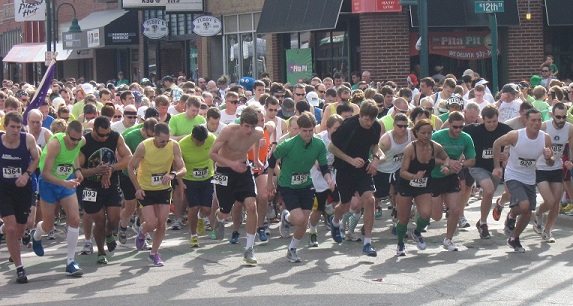
THINGS YOU SHOULD DO/ASK YOURSELF BEFORE YOU BEGIN MARATHON TRAINING
Am I ready to run a marathon?
The first step in how to train for a marathon is to make sure that you are actually ready to commit to the challenges of training for a marathon.
Here are some questions to ask yourself to make sure that you are truly ready to begin marathon training:
- Is your body up for the challenge?
- Do you have the time to carve out and adequately give?
- Can you run (or run/walk) at least 4 miles?
- Do you currently run about 15-20 miles a week?
- What is your running history?
- Answer these 13 specific questions to determine if you are ready to run a marathon.
Note for couch to marathon runners
If you have a goal to run a marathon, however you are a non/runner or have running background (and especially if you have no fitness background as well) here are some things to think about when considering how to train for a marathon:
1. If you are a female older than 55 or a male older than 50 it would be ideal to consider filling out this quick PAR-Q+ form.
It will help you determine if you are ready to begin running and training for a marathon or if you should see your health care provider first.
2. Depending on the marathon training schedule that you are choosing to use, will help you determine what kind of running background you will need before you begin training.
For example, someone using the 32 Week Beginner Marathon Training Schedule can get by with a shorter history of running versus someone who would like to train with the 12 Week Marathon Training Plan.
What is your goal in training for a marathon?
Getting very specific about what you want out of a marathon is KEY in choosing and sticking with a marathon training schedule.
It's also a key component in how to train for a marathon.
Without a goal you can easily become swayed by your current emotions which could mean dropping out of marathon training and not sticking with your goal.
Your goal should be written down and placed somewhere that is visible to you, where it can hold you accountable.
So...
Ask yourself WHY you want to run a marathon.
Give it plenty of thought.
It should be strong enough to help be a motivating factor to get you out the door on your scheduled training runs even when you are not feeling it.
People with goals go places and accomplish what they set out to do so do not skip this step!
Use this Goals Sheet for Runners to help you determine your goal!
How to train for a marathon STEP 2:
What marathon training schedule is best for you?
You are now faced with one of the most important tasks of how to train for a marathon: deciding which marathon training schedule is right for you.
However, this can be a difficult task but also one of the most important steps in how to train for a marathon.
Your training plan will largely determine your success or failure so it's imperative that you choose the right one for you.
How to choose the right marathon training plan for you

Here are some things to consider when choosing a marathon training schedule:
As I mentioned previously, which plan you choose will be dependent on your goals and your why for this marathon.
So here are some questions to ask yourself:
Is this your first marathon?
You need a beginner plan that's not filled with fancy workouts, and high mileage weeks, unless perhaps you are a seasoned runner.
Do you want to reach a time goal?
You will need to find a training plan that allows your body to peak at your optimal goal at the appropriate time.
Have you run multiple marathons and simply want a guide to follow?
Perhaps you just need a plan to follow that you can customize to yourself and take from it what you need and what aligns with your goals.
There is no size fits all when it comes to training for a marathon.
How long do you have to train before your marathon race day?
Obviously this will play a big part in the plan you choose. Do you have 3 months, 6 months, or a year? Think about how much time you have to work with before your marathon race day.
What is your current running or fitness level?
Consider how far you can run now.
Are you able to run (comfortably!) the longest run that is scheduled during week 1 of that marathon training plan you are eyeing?
You should be able to. Always start with where you are at so that you can keep on building!
You probably are also already asking yourself how long you actually should train for a marathon? What's a healthy timeframe for you?
Let's talk about that next!
How long should you train for a marathon?
There are many different answers that one might receive to this question but really the answer is:
It depends on the runner!
Here are some things you will want to consider:
- What does your running history look like?
- Have you ever run a marathon before? A half marathon? A 10K?
- When was your last run?
- When was your last race?
- How does your body feel?
- Is this a recreational marathon race or are do you want to break a time goal?
The sweet spot for most runners seems to be between 16 to 20 weeks.
Here's a more in-depth page that talks about how long you should train for a marathon. It will help you to more definitely answer the question for yourself.
how to choose your marathon training plan based off of your finishing time goals
Is this your first time running a marathon?
Your goal should be to get across the finish line, happy and healthy!
Do not worry about time and fancy running workouts.
Focus on your long distance running form, building stamina, listening to your body, etc.
26 miles is a long way and for a first time marathoner you want to train yourself to think and feel as a long distance runner.
Therefore you will want to find a beginner level marathon training schedule.
And that is what I have for you next in this how to train for a marathon ultimate guide!
beginner marathon training schedules:

This 16 week Marathon Training Schedule
This is a great option for those who are new to the marathon and want to block off a quarter of a year to fulfill their marathon dream!
12, 16 or 20 Week Marathon Training Schedule which are all included inside the Run Your First Marathon Program
This is a complete training package that comes with 3 different marathon training schedules that you can use as you are guided through how to train for a marathon as a first time runner:
- a 12 Week Marathon Schedule
- a 16 Week Marathon Schedule
- a 20 Week Marathon Schedule
The 32 week Marathon Training Schedule
This is one of our most popular training schedules especially for:
- Couch to marathon runners
- Runners with a busy/hectic lifestyles: parents/caregivers/shift workers, etc.
- Older runners who want a simple and dare I say "easy" approach to the marathon
Have you previously run a marathon or possibly half marathon or are you a seasoned runner?
If this is you, you are probably looking for a marathon schedule that is slightly more challenging.
Here are some intermediate marathon training plans and some time goal marathon plans that might fit what you are looking for.
Intermediate & time goal marathon training schedules
These plans, unlike the beginner marathon training schedules listed above, contain speed training, hill workouts and cross-training.
It's upping the level!
Each of these plans come with a layout of what days to run which running workout.
Obviously you may want to modify the plan to meet your daily schedule.
Just be sure you are putting in the miles, because that is what marathon training is all about: building endurance!
I have 2 intermediate marathon training schedules:
12 Week Intermediate Marathon Training Schedule
This is a perfect option for those who want to train for a marathon in 3 months! There is a variety of running workouts included inside 3 different training blocks.
The 16 Week Intermediate Marathon Training Schedule
This 4 month marathon training plan will give intermediate runners a bit more time to train at a level where they can challenge themself!
I also have 7 Finishing Time Goal Marathon Training Plans:
Each of these time goal training plans are 4 months in length and combine several different types of running workouts to help you peak at exactly the right time!
- Break 5 Hours in the Marathon 16 Week Training Plan
- Break 4:45 in the Marathon 16 Week Training Plan
- Break 4:30 in the Marathon 16 Week Training Plan
- Break 4:15 in the Marathon 16 Week Training Plan
- Break 4 Hours in the Marathon 16 Week Training Plan
- Break 3:45 in the Marathon 16 Week Training Plan
- Break 3:30 in the Marathon 16 Week Training Plan
How to train for a marathon STEP 3:
do you Understand all the workouts that are scheduled on your marathon training plan?
Depending on your goals and your marathon training schedule, there are different running workouts that will be included in your training plan.
It's important part in how to train for a marathon to understand the purpose of each workout and how to perform them properly.
Most first time marathoners will focus on the long run, base runs, and cross training.
An intermediate or second time marathoner or marathoner with a time goal might incorporate many different running workouts.
These are the most common running workouts found on marathon training plans:
The Long Run
Usually the core of a marathon plan, these typically take place every week or at most every other week.
Find all you need to know about how to run your best long runs here.
Hill Training or Strength training workouts
Workouts such as hill repeats and hill sprints are the best strength exercises for runners to help you become stronger and ultimately faster.
Here is a guide on how to run hill repeats.
Here is a look at how to run hill sprints.
There are specific times during a training plan where you will want to include one or the other so be careful about when you are performing hill repeats or hill sprints.
speed training workouts
There many different types of speed workouts that might be scheduled on your marathon training plan.
Some of the best speed training workouts for marathon runners are:
- interval training workouts
- tempo runs, (also known as threshold training runs or lactate threshold training runs)
- fartleks
All of which train your body to meet time goals and become faster!
cross training workouts
Adding other exercises can be very important to your training and help to protect your body from injury while giving your running muscles a break.
Not all training plans include cross training though especially if you are working with a shorter time frame or have a more intense training goal.
Here is my guide to cross training as a runner.
I also have a list of favorite YouTube Cross Training Workouts for Runners here.
Recovery runs, strides, progressive and goal pace runs, etc.
There are many different running workouts that might be scheduled on your training plan.
For a full breakdown of all the different types of running workouts that might be included on your marathon training schedule see this guide on Running Workouts for Long Distance Runners.
how to train for a marathon step 4:
What do you need to begin training for a marathon?
Being prepared for everything that marathon training might throw at you is one of the biggest favors that you can do for yourself as once you begin, your time will be a bit more limited.
So let's talk just a bit about marathon running gear!
I like to create a "running stockpile" of everything that I might need to complete a run. It's actually two stockpiles: one for clothes and one for gear.
Some marathon training gear essentials that I like to have on hand are:
- a complete running outfit always ready to go
- watch
- sunscreen
- running hat
- fully charged blue-tooth earbuds
- recovery items: body glide, Band-Aids, moleskin
- seasonal items such as cold weather items: warm hat, gloves, neck wrap or gear for running during the rainy seasons (Tips + Gear for running in the rain here.)
- all the necessities if I'm running in the dark (Here are my 3 favorite pieces of gear for running in the dark)
I highly recommend brainstorming your own list and then gathering all your needed items into one spot.
Here is my list of the top 10 pieces of essential marathon training gear that I think all marathoners should have.
I also have more extensive list of running gear here + what you might want to keep in your car if you drive to parks or trails to run.
And since your shoes are typically one of the most important pieces of running gear, here is my guide on finding the best running shoes for marathoners.
how to train for a marathon step 5:
do you understand what it takes to fuel your marathon training?
Eating a certain marathon diet and giving your body what it needs in order to train and run a marathon is absolutely critical to your success.
This is such a huge topic so I recommend starting with this page on what your marathon training diet should look like!
Some other important marathon nutrition resources you might enjoy are:
- How to choose the best energy drink for you as a marathon runner
your ultimate personalized marathon nutrition resource though is hands down the eat like a marathoner nutrition course!
The Eat Like a Marathoner Nutrition Course will walk you through step by step on how to develop your own personalized marathon nutrition plan that will fuel and energize you all the way to the finish line!
how to train for a marathon step 6:
THINGS TO DO ONCE YOU BEGIN TRAINING
Always Be prepared for your long runs!
The long run is the core of your marathon training schedule.
They take a lot of time and commitment. They are the test as to whether or not you are progressing with your training and will ultimately be able to handle the marathon.
Develop a system each week to prepare for your long runs so that they go smoothly.
Your guide to running your long runs
Here's a guide on how to run your long runs. It will help you with planning, preparing, pacing, and set you up with everything you need to have the best long run possible!
Here is a full page of long distance running tips to help you crush your long runs!
There are 3 different types of long runs that most runners use during their marathon training schedules:
- Easy long run
- Goal pace long run
- Progressive long runs
In general, beginner marathoners will mainly do easy long runs while intermediate runners who possibly have time goals will want to include goal pace and progressive long runs into their training.
See this page for more information on each of these styles of long runs.
how to pace yourself during a long run
If you aren't sure what pace you should be running during your long runs then hopefully this post on finding your ideal long run pace will help you to see exactly what pace and why you will want to train at.
Let me give you a hint though. You probably should be running much slower than you actually are.
Here are some other long run pacing tips you might want to utilize.
How to recover quickly after a long run
Recovery is also paramount to the continued success of your marathon training schedule.
I have an actionable long distance running recovery plan that you will want to utilize immediately (within the first 24 hours) after your run!
Be sure to download the free cheat sheet on that page!
how to train for a marathon step 7:
find a great energy drink that is made specifically for long distance runners
Choosing the right energy drink can make or break your marathon game!
Because you are running such long distances when you are training and running a marathon, you will need to re-fuel along the way.
You must have adequate fuel to power your running at the pace you want and for the distance you need to go.
The best way to refuel during your longer runs is by using energy drinks.
Although you can eat solid foods to help you refuel, liquids provide energy to your body at faster rates and are easier on your digestive system.
They also usually are able to provide more energy to you than a solid food such as a banana.
This makes energy drinks a more popular form of re-fueling.
You may need to test different energy drinks out until you find the one that is right for you.
Here is my guide on finding the right energy drink + the recommendations on the best energy drinks that are out there for marathon runners!
I also have a free cheat sheet guide to the best energy drinks for runners that you can sign up to download on that page.
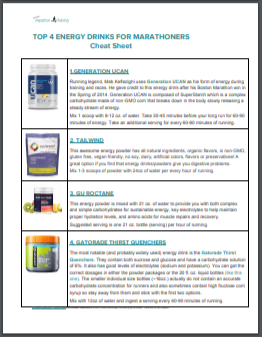
how to train for a marathon step 8:
Practice your marathon pace

Pacing is another vital component of marathon running and the strategy involved in being able to run 26 miles.
You might be thinking, "I'm not training for a time goal" or "this is just my first marathon, I don't care what my pacing is like".
However, your marathon pace can translate into how much stamina you have to keep on going for hours on end.
In fact, pacing during your marathon is more about making sure you are not going too fast in the beginning stages of the race!
It's easier to get carried away on race day with the atmosphere and adrenaline but if you keep yourself in check you will find it much easier to sustain your running or (run/walking) during the later miles of the race instead of falling to pieces.
However, in order to pace yourself accurately during the marathon you must be practicing during your training runs!
marathon pacing guides
Look at this marathon pace chart and finishing time calculator that will tell you when you will finish the marathon at the pace per mile that you run at.
If you have a big goal you want to meet this page will help you learn how to find and train for your marathon goal race pace.
Here are some more pacing tips that you will want to utilize!
how to train for a marathon step 9:
Find ways to keep yourself excited about marathon training
...but only rely on discipline.
Staying motivated throughout your marathon training schedule can be one of the biggest challenges of your training.
It's best if you set the expectation up front that you will have days and runs that you just don't want to do.
The only thing that will truly get you through is self-discipline (and a good attitude!).
However, you can still try to find things that motivate you.
some of my favorite ways to add juice to my running motivation are:
- Listen to a running podcast on my runs
- Listen to or read a running book
- watch a running or marathon movie (Spirit of the Marathon is awesome and one of my favorites!)
- Getting on Pinterest and scrolling through running related articles and photos (Hey, come follow me there!)
- Completing a run. This might sound ironic but even just finishing a run is motivating to me.
Here are a bunch more ways + tips for staying motivated as a runner. You will find lists of running books, movies, and quotes that might help to inspire you.
How to train for a marathon step 10:
include some form of mental training
A lot of the battle during the marathon comes down to your mental will power.
In fact, those who have run a marathon know all too well the saying that the marathon is 20% physical and 80% mental.
Our minds truly play a pivotal role in getting us to the finish line.
Unfortunately, many marathoners put so much effort into their physical runs yet completely neglect the mental aspect of it all.
They leave so much potential on the table and are ill-equipped for those later stages of the marathon by not utilizing mind tools!
To combat this, and give marathon runners an actionable guide to use to harness their mental power over their running, I created the 20 Week Mindset Training Plan for Marathoners to really help you learn how to use your mind to conquer the marathon! It can be used in conjunction with any marathon training schedule!
how to train for a marathon step 11:
be proactive against running injuries
Since you are putting in so much time into your running and marathon training schedule, and taking in all there is to know about how to train for a marathon, the last thing you want is to be side railed by and injury.
Did you know that first time marathon runners are a high injury risk population?
This is due to the increase in weekly mileage and long run mileage!
The best thing you can do in this area is to be proactive against it!
in regards to running injuries, learn how to:
- determine between an ache and a pain
- combat soreness especially lingering soreness
- address symptoms and pinpoint what's bothering you right from the onset
- ask for advice
- set up any appointments as soon as needed
- be your own health advocate!
The biggest tip though that I can give you is to never run when you are in pain.
We talk all about running injuries over here - the most common types that plague runners and what you need to do about them to prevent them and care for them.
things you should do in the final two weeks of your marathon training schedule:
how to train for a marathon step 12:
Properly taper before your marathon race day
During the final week to two weeks of your marathon training schedule, you will want to include a tapering period into your schedule.
Tapering is simply the reduction in training load (volume or amount of training and intensity) in order to achieve peak performance prior to a race.
In most cases your weekly mileage will be cut (sometimes dramatically) to help prime you for race day.
There is usually not much you need to do going into a taper, however it can be beneficial to know why exactly you are implementing a taper phase into your marathon training schedule.
Here is my guide on why you should taper + how to do it properly.
how to train for a marathon step 13:
Plan out your nutrition onto your marathon training schedule before race day
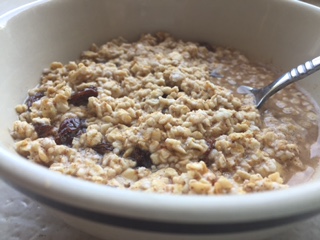
A successful marathon begins with training but it can end with your nutrition.
If you don't give your body the food and fuel that it needs you will find yourself bonking and hitting that dreaded marathon wall during the race.
This is another area that you need to be proactive in and not wing it on race day.
1 to 2 weeks before your marathon race date, plan out your:
- carbo-loading days
- your pre-race meal
- your race re-fuel plan
- and your nutritional recovery plan
Doing so will make you primed and ready to succeed at the marathon distanceand will be able to give your body what it needs to crush it on race day.
I have an ultimate strategy guide that helps you plan all of these marathon nutrition components out leading into race day in my nutrition course, EAT LIKE A MARATHONER.
Here are a few other important resources that you will want to use the week before your marathon race:
- Carbo-loading Guide + a free downloadable list of high carbohydrate foods and menu planning
- Racing Runners Nutrition: How to eat the week before a marathon!
how to train for a marathon step 14:
Make a checklist of what you need to do the week before the marathon
As Benjamin Franklin says, "Failing to prepare is preparing to fail".
There is a lot to think about before running a marathon and doing this step well in advance will make sure that you have what you need going into race day and help reduce any overwhelm.
The week leading up to a marathon can leave you anxious.
Setting up a plan for yourself will do wonders in reducing your stress and anxiety.
things to do during the week before a marathon:
Carbo-load!
Here's a guide on what you need to know about carbo-loading before a marathon as well as a 3 Day Carbo-loading menu plan)
Gather all the items you need before, during, and after your race day
Hydrate extra!
Here's some tips on hydrating well for race day (and your long runs!)
Eat a solid pre-race meal
Here' a guide on what you should include in a pre-marathon race meal as a marathon runner.
Focus on your mental attitude throughout the week
Keep your outlook and thoughts positive. Stay aware of how you are talking to yourself. Trust in all the hard work and training that you have put in!
Get enough sleep the entire week before your race
This can definitely be hard to do but here are some things you can do that might help:
- Limiting your phone and social media usage
- Doing calming activities at night
- Making a list and checking it off
- Writing out your action plan so your mind doesn't keep mulling it over
Pick up your registration packet.
Be sure to check the times that you are allowed to pick up your race packet so that you don't waste time or end up being in a time crunch because you failed to plan.
Here's a full timeline of things you won't want to miss doing during the week before the marathon!
how to train for a marathon step 15:
Know what to expect on race day
It's a great idea to visualize what you race day might look like even if it doesn't actually play out that way.
Have a plan going into the day and implement!
Here are some things you might want to do on race day:
- Plan extra time to get to the starting line and get there early
- Do a light warm-up
- Wear compression socks
- Eat a light breakfast or meal/snack (liquid meal or even your energy drink is best if it's anytime within 4 hours before your race start!) Here are 6 breakfast ideas for race day that you can make ahead of time.
- Start out slow
- Don't panic on the hills
- Have fun!
how to train for a marathon Bonus step:
Give your body time to recover from the marathon

After working so hard during your marathon training schedule to help you cover those 26 miles, give it grace and allow it to recover properly!
Treat your body well and it will be good to you.
Go into your marathon with an idea of how your recovery might look like.
Break it down into the first 24 hours, the first week and even up to that first month post race.
Also, be sure to have stocked up on some marathon recovery essentials (I have a list of 17 marathon recovery essentials right here) and bring them with you to the race!
Here are some things you might want to consider including in your marathon recovery plan
- Check for swelling
- Actively work towards reducing inflammation
- Hydrate
- Eat a good recovery meal
- Do light workouts and jogs
- Book a massage or chiropractor appointment
Here's an extensive timeline of things you can do to speed your marathon recovery!
Also, here is a list of 10 foods and activities that you might want to include during that first week after a marathon to really jump start the recovery process.
Here is another detailed guide on how long it takes to recover from a marathon + tips on how to get back into running and long runs.
How to Stay in shape in between races
Take time off after your marathon but if you want to stay in shape devise a plan to keep pushing yoruself along the right path!
This will look different from runner to runner.
I personally like to stay in 10K shape year round so that I can jump into half marathon or even marathon training at a moment's notice.
I do this by trying to include a run 2-3x a week, and doing a strength trainingon my other workout days.
I also try to run a 6 mile run at least every couple of weeks or so to stay at that 10K level.
If you are worried about gaining weight and how to stay in shape in between your races and training cycles then I have a plan of action you can follow here to help you stay in shape during your off-season.
As a runner, it's beneficial and fun to stay in running shape in order to be able to sign up for any race at short notice!
How to improve for your next marathon
Many runners who complete a marathon want to go on and run another one! What? Is it true?
Yes!
If you think you might have another marathon or two inside you consider doing a reflection/assessment while your current marathon and training period is still fresh in your mind.
Reflection really helps you grow and learn as a runner. What went well, what could have gone better, what didn't work out at all.
These are all things you should ask yourself and record your thoughts so that when you are ready for your next marathon training schedule, you will be able to avoid similar mistakes and build off on what you did well!
A final word on how to train for a marathon...
Remember that this is a journey.
You are going to experience ups and downs just as in any journey.
Know that they will come, the good days and the bad, be prepared for it and you will know that you have done your best.
Work hard, train hard, put in the effort and you will be a marathon finisher!
Extra resources on how to train for a marathon
- Marathon Training: How Long Should Your Longest Run Be?
- Top 3 Most Important Things to Focus on During Marathon Training
- Are you over-training? Signs + Symptoms
- Top 16 Things to do Before You Begin Marathon Training
- The 7 Staples of a Marathon Training Diet
- 11 Benefits to running on a treadmill
- Tips to Beat Your Last PR
- 7 Tips for finishing strong at the marathon finish line!
- How to find your Vo2Max Fitness Level as a Runner
- How to Run Faster: 5 Ways to Increase Your Running Potential
- 15 Secrets of Successful Marathoners
- How to find time for Marathon Training
- Breathing tips for runners
- Tips to help you during a marathon when it's not going your way
👋Sign up to receive the free printable strength exercises for runners: 👇
 |
As featured on:

Alternate Images:

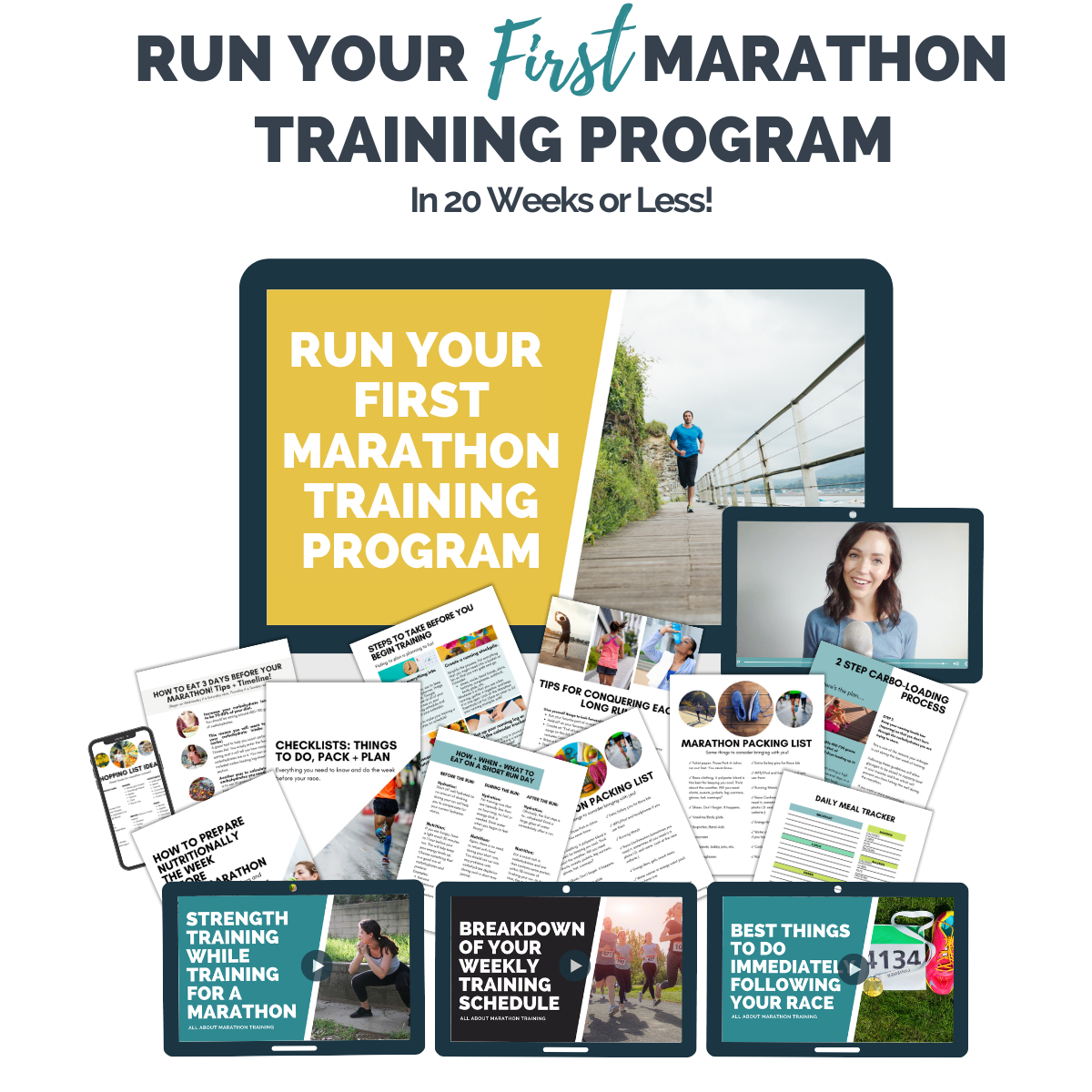


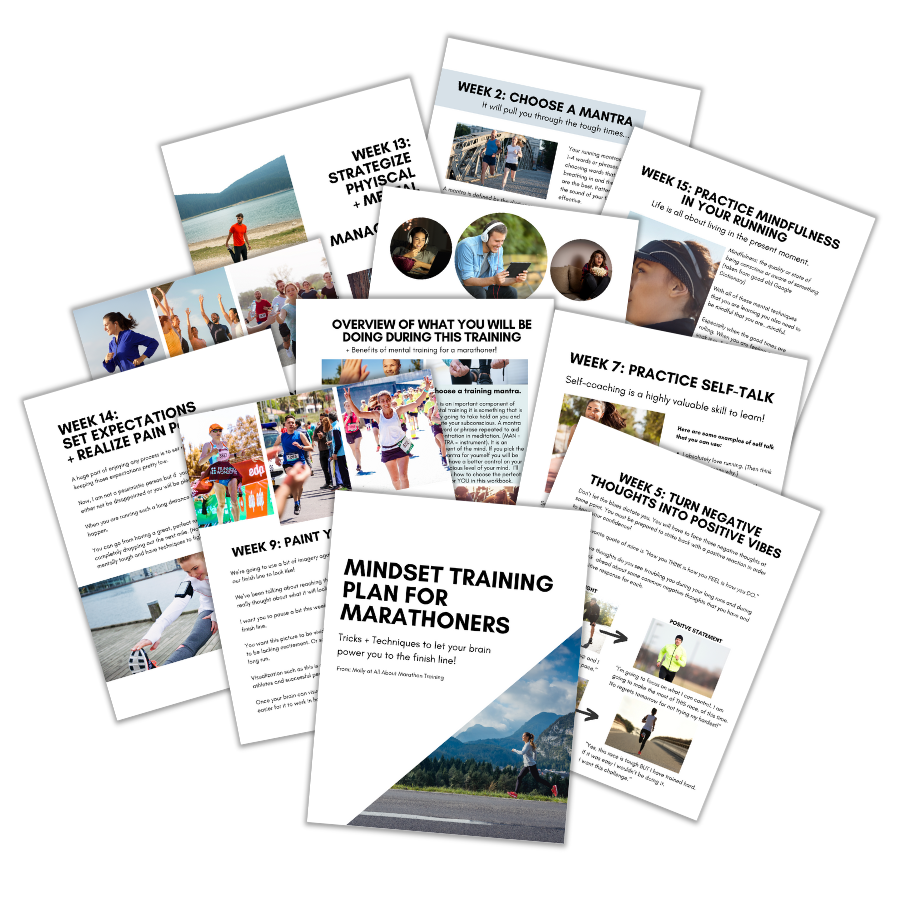

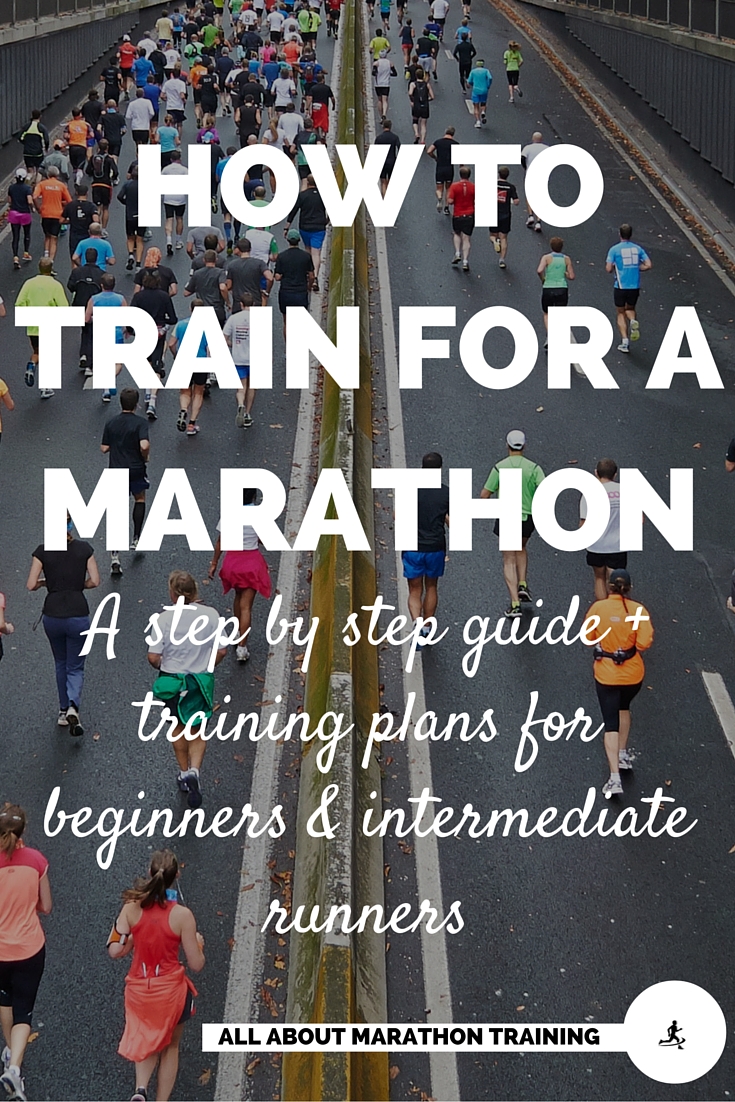
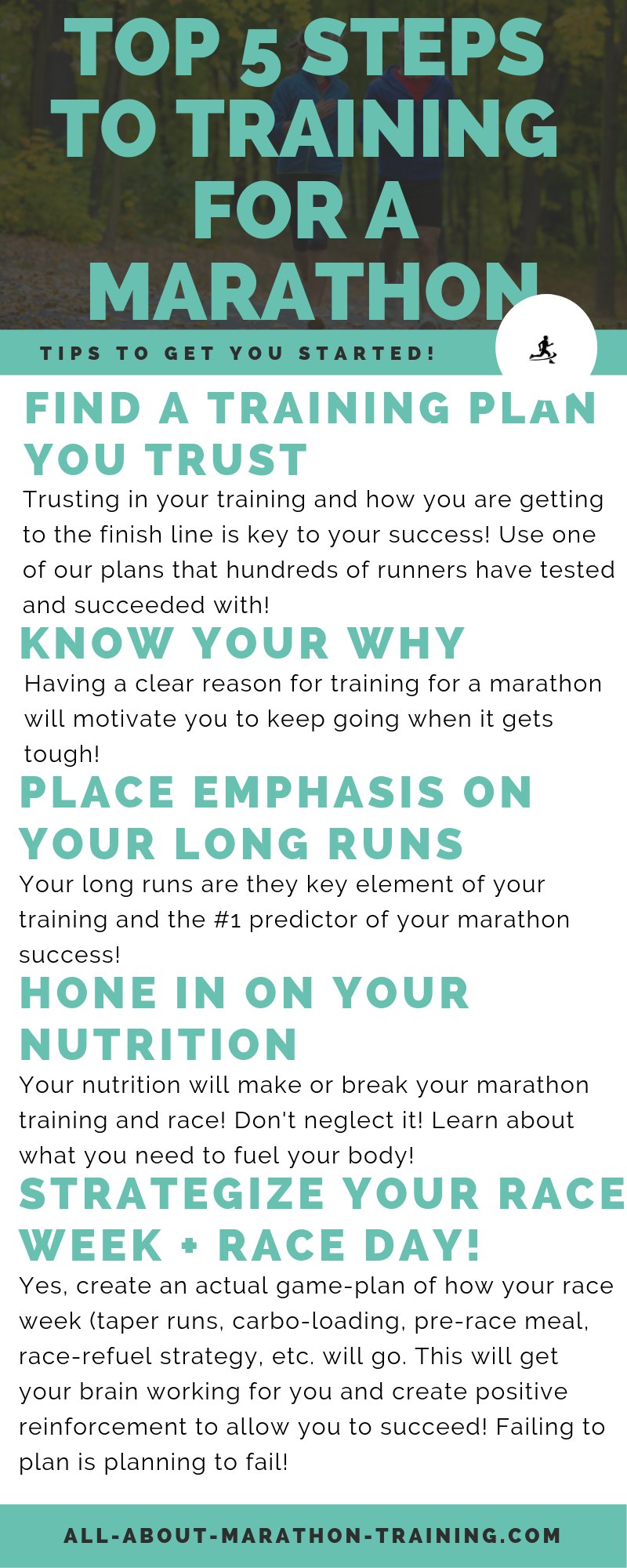

New! Comments
Have your say about what you just read! Leave me a comment in the box below.